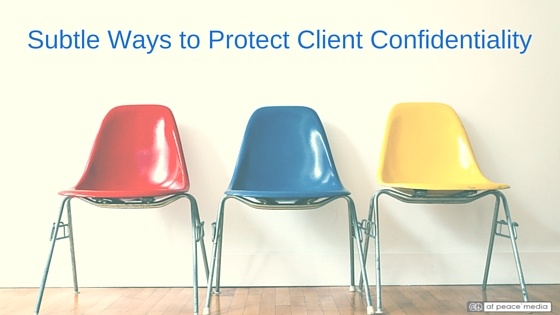Subtle Ways to Protect Client Confidentiality

It seems clear. We should not disclose who our clients are, when they come in, or why they see us. Boom. Black and white.
Except it's not clear. Client confidentiality is complex at its core, and made more confusing if you get the bulk of your clients from word of mouth (which most of us do).
I'm not speaking from a pedestal. I've struggled with the gray areas, and screwed up many times. I've learned from experience. Over the years I've identified the most common situations that pop up, and some scripts to handle them properly.
Don't discuss clients with other clients
Well, duh. But it's trickier than that. It can come up in an innocent way, especially when your clients are your biggest referral sources. Here's an example:
Blanche (my regular client) buys her friend Rose a gift certificate. Blanche comes in a few weeks later for her appointment and asks if Rose has scheduled yet. You tell her Rose hasn't. No biggie right? It's probably fine to acknowledge that someone isn't a client. But then Blanche nags Rose about using the gift certificate. And Rose isn't scheduling because she's got a tough health issue she isn't ready to talk about. It's none of my business, it's none of Blanche's business. And we just made it an issue.
Or, if Rose did come in, we could say, "Yes! She used the gift certificate, thanks for sending her in." But now we've just violated Rose's confidentiality. Maybe Blanche is actually a big pain in rear and Rose prefers to have some privacy. (Some of this gray area could be easily resolved with an line on your intake form that asks, "Referred by" and "May I thank them for referring you?" Then you know it's cool to acknowledge the appointment to the referrer or gift certificate purchaser.)
So what's the appropriate answer here?
Well, that would be a great questions to ask Rose!
I'll let you ask Rose that question.
Be polite, smile. Most people will get it. If they press the issue, just say straight out.
It's important to me to protect client confidentiality. So I prefer to not acknowledge if someone has or hasn't been in.
That's clear, kind, and it'll likely earn you some serious respect.
Often we treat several people within the same family or group of friends, and it's not uncommon for someone to ask a question like, "How is Dorothy? Is massage helping her headaches?" The suggestions above apply to those situations, too.
Don't discuss clients at home
The details, even what you think are 'vague' references to clients, do not belong at your dinner table. You may think you are being obscure enough to make it acceptable. But over time, references to the same clients are enough to make a full picture.
Telling your spouse or your kids that it's private information is not enough. It's YOUR responsibility to keep a client's confidentiality. You. And the moment you overshare, you give that responsibility to someone else. These same rules apply with close friends. Your personal confidant should not be your professional confidant.
So, how should you answer (and be genuine) when a friend or family members says, "How was work?"
Great! Everyone showed up on time and I remembered my lunch.
Hard. I didn't sleep well and the whole day dragged.
Challenging. But good.
I think you get the idea. You can be honest, and not give details.
We all need to vent and process both typical and challenging client cases. This is what trusted colleagues and mentors are for. Ideally, you can have conversations with colleagues you trust. But even then, you should keep identifying client details confidential (especially if your colleague lives or works in the same community as you).
These are the gray areas I run into most. But I'm curious, what do you struggle with? How are your confidentiality boundaries tested in day to day practice?
